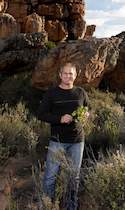'I’m just a farmer.' But in the Cederberg that includes wearing the broad mantle of environmental protector, even more so than in more densely cultivated parts of the Cape Winelands. Dwarsrivier is one of eight private properties bordering on the Cederberg Wilderness Area, 183 000 hectares of rugged, mountainous terrain proclaimed in 1973.

David's return to the farm in 1997 coincided with the establishment of the Cederberg Conservancy, a voluntary agreement between private landowners and the government to manage the environment sustainably.
'We're one of 19 members and get together on issues such as the Cape leopard research project, fire protection, restoration of the endemic Clanwilliam cedar tree [Widdringtonia cedarbergensis]. indigenous fish conservation, water usage and recycling, local community development, tourism...'
It's also only the third wine farm in South Africa to enter into a stewardship contract with CapeNature to conserve the vast majority of its land (5 000 hectares) in perpetuity.
Dwarsrivier acts as one of the area's central tourism 'offices', with between 200 and 350 people moving through every weekend; These include campers coming to the farm's campsite, Sanddrif, on the Matjies River, started by his mother in the 1960s.
Perennially popular yet pristinely maintained, it's the base for hikes to several much-loved Cederberg landmarks, including the Maltese Cross and the Wolfberg Cracks.
The latter is on the farm, towering above the campsite, a special place of reference for David from his blocks of vines scattered among the area's unspoiled fynbos and signature red rock, eroded by the wind from iron-rich Table Mountain sandstone into endlessly evocative formations.
David himself does a hike about four times a year. 'The rocks with all their shapes, the smell of the veld and the silence; that's something special.'
But he's equally excited about the mountain bike trails he's laying out on the farm with the guys involved with the Cape Epic.
David can reel off facts and figures when necessary; others might mention the myriad awards his wines have accumulated. He states, quite dispassionately, that such success may seem surprising for such a young farm. He's not being cocky.
For him, the quality of wine from the Cederberg was always a given. He prefers to talk about how quality comes from the right environment and how important his clients' loyalty, good agents and, the support of wine buyers and wine drinkers are to him. 'We're lucky,' he says.
But, as the saying goes: the harder one works, the luckier one gets.